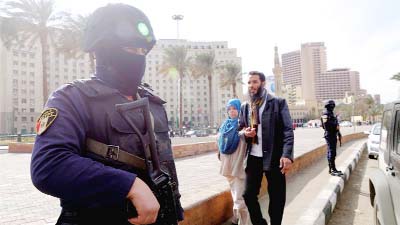
Al Jazeera News :
Anti-government protesters defied a security crackdown and took to the streets as Egypt marked the fifth anniversary on Monday of the 2011 uprising that toppled long-time ruler Hosni Mubarak.
Egyptians demonstrated on Sunday night against the military-led government in Alexandria’s Al-Qaed Ibrahim Square, which was the site of 2011 protests, as well as in Nasr City and Shubra district in the capital, Cairo.
Residents reported that the build-up of security forces which, along with recent crackdowns on activists and arbitrary raids on homes, reflected the government’s resolve to prevent marking the anniversary with popular demonstrations similar to those in 2011.
In a televised speech on Sunday, Egypt’s leader Abdel Fattah el-Sisi argued that his government was continuing the aspirations of the 2011 uprising, in spite of the documented human rights violations under his rule, as well as the worsening economy.
The president’s speech came just a day after Sisi, a soldier-turned-politician who claimed office in 2014 following victory in an election considered to be suspect, praised the country’s police and vowed a firm response to any threat to the country’s “stability”.
His nod to the police ran against growing complaints by rights activists that forces have returned to Mubarak-era practices such as torture, random arrests and, more recently, forced disappearances.
Police brutality was among the complaints that drove Egyptians to take part in the 2011 uprising.
Sisi alleged that the 2011 uprising had deviated from its course and was forcibly hijacked for “personal gains and narrow interests”, in a thinly veiled attempt to justify the military’s ousting of Mohamed Morsi, Egypt’s first democratically elected president.
The Muslim Brotherhood – the organisation that Morsi was a member of and the largest social movement in Egypt – has been banned and was declared a “terrorist” group in the aftermath of the 2013 coup.
According to Sisi, the “June 30 revolution” – a reference to the day in 2013 when protests erupted in Cairo against Morsi, culminating in the July 3 coup – corrected the course of the 2011 uprising.
But with an estimated 40,000 prisoners, including thousands of opposition activists, and a parliament that many say is unable to properly check executive powers, analysts say that Egypt has veered far off the course set by nationwide protests five years ago.
Many say the continued deterioration of the country’s economy, the security crisis particularly in the Sinai Peninsula that many blame for the rising threat of the Islamic State of Iraq and the Levant (ISIL) group, and Sisi’s policy to crush any dissent have all contributed to a climate far more repressive than the conditions that sparked the 2011 uprising.
While Sisi remains popular among many Egyptians, he no longer enjoys the reverence that once saw his image – complete with a military beret and sunglasses – on everything from posters to women’s underwear in the conservative Muslim nation.
Anti-government protesters defied a security crackdown and took to the streets as Egypt marked the fifth anniversary on Monday of the 2011 uprising that toppled long-time ruler Hosni Mubarak.
Egyptians demonstrated on Sunday night against the military-led government in Alexandria’s Al-Qaed Ibrahim Square, which was the site of 2011 protests, as well as in Nasr City and Shubra district in the capital, Cairo.
Residents reported that the build-up of security forces which, along with recent crackdowns on activists and arbitrary raids on homes, reflected the government’s resolve to prevent marking the anniversary with popular demonstrations similar to those in 2011.
In a televised speech on Sunday, Egypt’s leader Abdel Fattah el-Sisi argued that his government was continuing the aspirations of the 2011 uprising, in spite of the documented human rights violations under his rule, as well as the worsening economy.
The president’s speech came just a day after Sisi, a soldier-turned-politician who claimed office in 2014 following victory in an election considered to be suspect, praised the country’s police and vowed a firm response to any threat to the country’s “stability”.
His nod to the police ran against growing complaints by rights activists that forces have returned to Mubarak-era practices such as torture, random arrests and, more recently, forced disappearances.
Police brutality was among the complaints that drove Egyptians to take part in the 2011 uprising.
Sisi alleged that the 2011 uprising had deviated from its course and was forcibly hijacked for “personal gains and narrow interests”, in a thinly veiled attempt to justify the military’s ousting of Mohamed Morsi, Egypt’s first democratically elected president.
The Muslim Brotherhood – the organisation that Morsi was a member of and the largest social movement in Egypt – has been banned and was declared a “terrorist” group in the aftermath of the 2013 coup.
According to Sisi, the “June 30 revolution” – a reference to the day in 2013 when protests erupted in Cairo against Morsi, culminating in the July 3 coup – corrected the course of the 2011 uprising.
But with an estimated 40,000 prisoners, including thousands of opposition activists, and a parliament that many say is unable to properly check executive powers, analysts say that Egypt has veered far off the course set by nationwide protests five years ago.
Many say the continued deterioration of the country’s economy, the security crisis particularly in the Sinai Peninsula that many blame for the rising threat of the Islamic State of Iraq and the Levant (ISIL) group, and Sisi’s policy to crush any dissent have all contributed to a climate far more repressive than the conditions that sparked the 2011 uprising.
While Sisi remains popular among many Egyptians, he no longer enjoys the reverence that once saw his image – complete with a military beret and sunglasses – on everything from posters to women’s underwear in the conservative Muslim nation.

